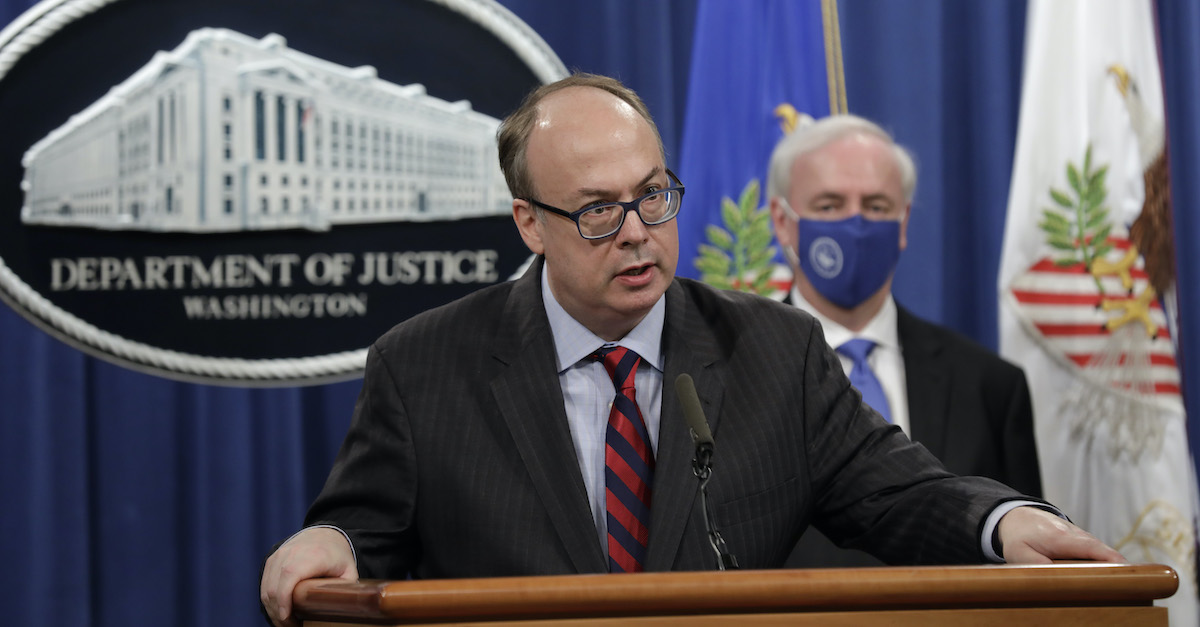
Acting Assistant U.S. Attorney General Jeffrey Clark speaks next to Deputy U.S. Attorney General Jeffrey Rosen at a news conference on Oct. 21.
An environmental lawyer with no experience in criminal or election law who rose to national recognition because of his apparent willingness to pursue Donald Trump’s election fraud conspiracy theories to the ends of the earth now faces ethics charges.
Jeffrey B. Clark, the then-DOJ lawyer Trump wanted to install as acting Attorney General of the United States a matter of days before the attack on the Capitol, has featured prominently in the Jan. 6 Committee’s hearings on the former president’s campaign to overturn President Joe Biden’s win in the 2020 election. On Friday, the morning after the latest hearing, it was first reported that the D.C. Bar Office of Disciplinary Counsel filed ethics charges against Clark.
The specification of charges said that Clark violated D.C. Rules of Professional Conduct 8.4(a) and (c) (“in that Respondent attempted to engage in conduct involving dishonesty, by sending the Proof of Concept letter containing false statements”) and Rules 8.4(a) and (d) (“in that Respondent attempted to engage in conduct that would seriously interfere with the administration of justice”).
The “Proof of Concept letter” is the draft letter that Clark put together in a bid to urge states Trump lost to “send unauthorized slate of electors to Congress,” according to the ethics charges.
During previous hearings, former Acting Attorney General Jeffrey Rosen and former Acting Deputy Attorney General Richard Donoghue got into the specifics about Clark’s near-ascent to chief law enforcement officer of the federal government. They testified that Clark wanted to send a letter to Georgia officials falsely claiming that DOJ had “identified significant concerns that may have impacted the outcome of the election in multiple States, including the State of Georgia.”
The draft letter also included a line recommending that the Georgia General Assembly “convene in special session so that its legislators are in a position to take additional testimony, receive new evidence, and deliberate on the matter consistent with its duties under the U.S.Constitution.”
The never-sent draft letter further urged swift action because Jan. 6 wasn’t far away:
Time is of the essence, as the U.S. Constitution tasks Congress with convening in joint session to count Electoral College certificates, see U.S. Const., art. II, § 1, cl. 3, consider objections to any of those certificates, and decide between any competing slates of elector certificates, and 3 U.S.C. § 15 provides that this session shall begin on January 6, 2021, with the Vice President presiding over the session as President of the Senate.
The specification of charges document, signed by Disciplinary Counsel Hamilton P. Fox, III, identified the following statements in Clark’s draft letter as false:
15. The Proof of Concept letter stated that the Department of Justice had “identified significant concerns that may have impacted the outcome of the election in multiple States, including the State of Georgia.” This statement was false. The Department was aware of no allegations of election fraud in Georgia that would have affected the results of the presidential election.
16. The Proof of Concept letter stated that the Department of Justice found “troubling the current posture of a pending lawsuit in Fulton County” and the “litigation’s sluggish pace.”. This statement was false. The Department had no involvement in the Fulton County case and was not concerned by its lack of progress.
17. The Proof of Concept letter stated that the Department of Justice believed “that in Georgia . . . both a slate of electors supporting Joseph R. Biden, Jr., and a separate slate of electors supporting Donald J. Trump, gathered on that day at the proper location to cast their ballots, and that both sets of those ballots have been transmitted to Washington, D.C., to be opened by Vice President Pence.” This statement was misleading. The Governor of Georgia had certified a slate of electors to the Electoral College pledged to Joseph Biden, and there was no legitimate alternative slate of Georgia electors pledged to Donald Trump.
18. The Proof of Concept letter stated that the Department of Justice had concluded that the Governor should convene a special session of the Georgia legislature. This statement was false. The Department had not made such a determination.
19. The Proof of Concept letter stated that the Department had concluded that if the Governor refused to convene a special session of the Georgia legislature, the legislature had the authority to do so on its own initiative. This statement was false. The Department had made no such determination.
A spokesperson for The Center for Renewing America, where Clark is a senior fellow, reportedly responded to the news by calling it an “attack” on the “legal qualifications” of an “American hero.”
“Jeff Clark is an American hero and the media sure seems to enjoy being the press secretary for the J6 committee,” she added.
— Sarah N. Lynch (@SarahNLynch) July 22, 2022
In October 2021, the Senate Judiciary Committee referred Clark to the D.C. Bar for a professional conduct investigation. That referral mentioned both the “Proof of Concept letter” and the professional rule prohibiting “conduct that seriously interferes with the administration of justice.”
“Clark’s continued pursuit of his ‘Proof of Concept’ letter despite being told repeatedly by DOJ leadership that his election fraud claims were baseless may implicate each of these rules,” the referral said.
Reuters reported in March that Rosen and Donoghue cooperated with the D.C. Bar Office of Disciplinary Counsel investigation into Clark. In June, the FBI searched Clark’s home, reportedly as part of a criminal investigation into attempts to overturn the 2020 election.
Read the document below:
[Image via Yuri Gripas-Pool/Getty Images]
Have a tip we should know? [email protected]